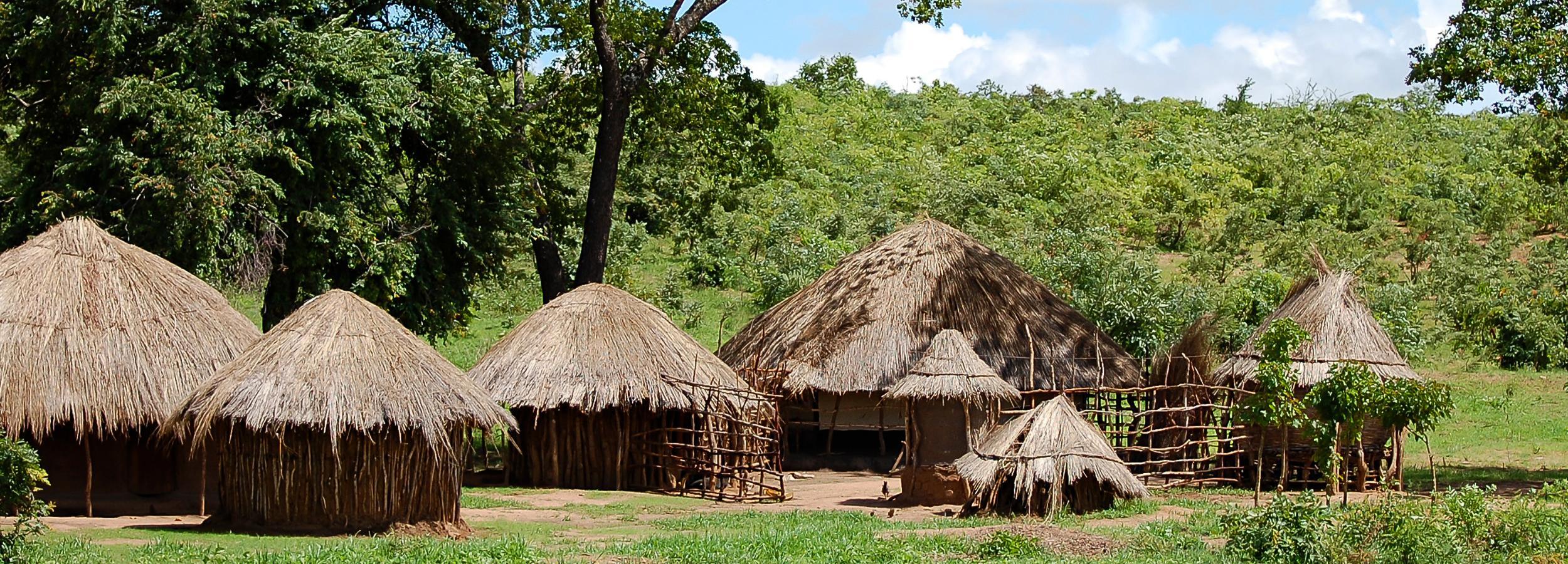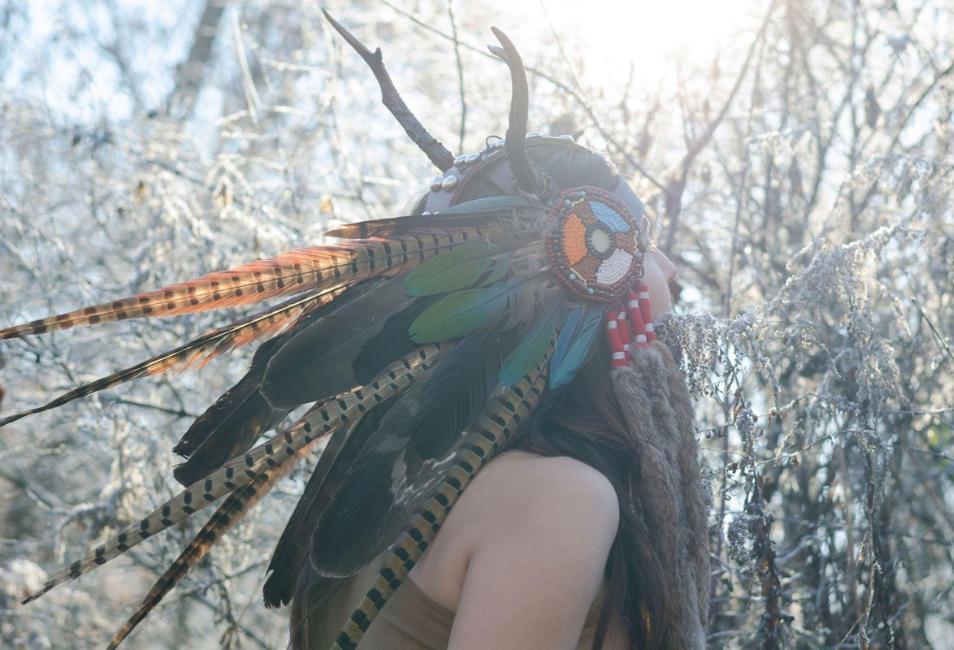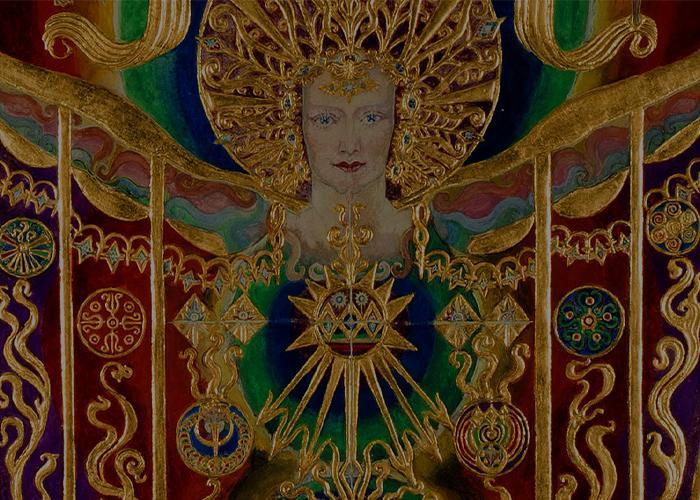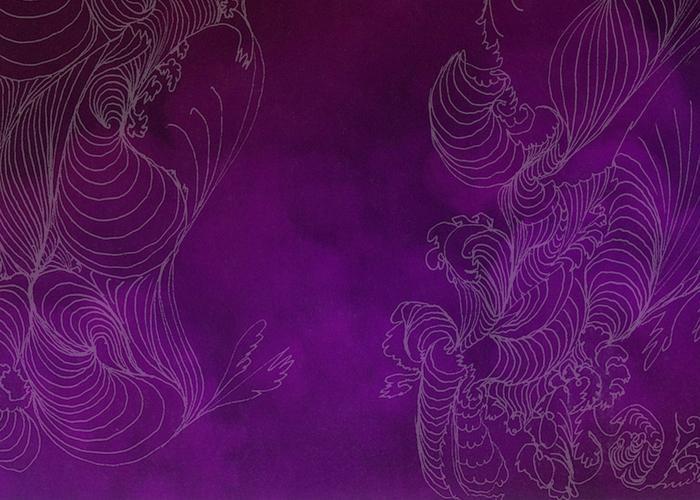It is pure chance that I am looking at Longo when Shamakowa brings her more reeds for the basket she is weaving. The woman's brows furrow in annoyance, her gaze lingering over Shamakowa's belly when the girl bends over to place the reeds in the heap next to her. Naturally, my gaze follows Longo's. Thankfully, the group of boys playing nearby start to fight just then, shouting indignantly as they jostle each other. Nobody hears my exclamation of surprise.
"Is that all you were able to find?" Longo snaps at Shamakowa. Her shrill voice is loud enough I can hear it over the cries of the still-fighting children.
"I walked all the way to the bend in the river to find these ones, Mother," Shamakowa mutters. The boys are quieter now, so her voice carries across the yard in which we have all gathered to weave baskets and mats.
"And you couldn't walk further to find more?" Longo sneers. People look their way. Shamakowa cringes at her mother's bitter tone and shrinks into herself under the increased scrutiny. I wince sympathetically. That disorientation of feeling yourself shrink into less space than your physical body occupies is one I am familiar with, even if for a different reason. Shamakowa's body is still chubby with baby fat, so it is not immediately obvious, but she is pregnant. Shamakowa is also still a mushimbi. She has not yet gone through her rites of passage. And she is betrothed to Lukendo whose mother, Shimbala, sits here with us. I glance surreptitiously at the woman but she is engrossed in her weaving.
I return my gaze to Shamakowa. Even if Lukendo is responsible, people will still call the child an abomination. Waimita imfunshi, they will say. It's always struck me as unfair how severely girls are punished when they get pregnant before their rites. The men involved bring cattle and are absolved. The girls are shamed and shunned, the babies left in the bushes to die. Sometimes, the girls with them. I worry about Shamakowa. From the way Longo is behaving, Shamakowa and the baby might meet this terrible fate, which would be unfortunate. I've had my eyes on Shamakowa for a while. She has a good memory and always comes back from the bushes with the big, heavy roots. She will make a good apprentice.
Longo continues to berate her daughter and the women gathered return their attention to their work, losing interest in them. Longo is an unhappy woman who takes her frustrations out on her children. We are all familiar with her vicious tongue and quick, sharp hands. I, too, turn my attention back to the mat I am weaving but I continue to listen to Longo's tirade, casting sidelong glances at them as I work.
I wonder how come Longo and the other women in their homestead hadn't seen that Shamakowa's menses had come. As is expected of her, Shamakowa would've kept it a secret when she saw blood stain her skins and waited for Longo or other women in her family to discover them so they could start kuzaluka for her. She's about the right age too so Longo should've been paying attention.
Shamakowa is Longo's only daughter, a child she bore with a man who died shortly after Longo conceived. But Longo has another child, a son, with her new husband, Nalubwe. The child, Nalubi, is asleep on a mat near his mother's pile of reeds. His labored breath and sweat-sheened skin tells me the fever that has plagued him the last couple of days has not yet broken. Nalubi is a sickly child with frequent bouts of fever and watery stool. Perhaps Longo, distracted with a sick baby, had forgotten to watch out for her older child? I am lost in thought, wondering what Longo plans to do so Shamakowa's yelp startles me. When I look up from my mat, she is rubbing her thigh, her eyes glassy with tears.
"Longo... enough! Kalemye kana, aze kakulemye! How do you expect your daughter to respect you when you treat her so carelessly?"
A hush falls over the yard when I speak. Even the little boys pause their game and stare over at us. Malice glinting in her eyes, Longo looks pointedly at my swelling belly before sneering. "Will you tell me how to raise my child, Mwaami? Are you ready for that child you carry?"
A collective gasp heaves the women gathered and several of them breathe Longo's name in dismay. She has gone too far.
"Don't talk like that, Longo." Galassi, who sits closest to Longo, speaks first, her tone heavy with censure even though she places a calming hand on Longo's thigh. "Chenjezha nganga, malwazhi eza bu seka. Remember who we all go to when our children are sick."
Longo has the presence of mind to look ashamed so I smile forgivingly when she casts a remorseful look in my direction. "Indeed, Galassi," I say, holding her gaze." And I'll never refuse to help a child. Even when her mother is disrespectful." I know Longo understands because her gaze slips away and I see the tension drain out of her body. I hope she seeks me out. I know she cares about Shamakowa. I know fear is what makes her angry. She has already lost three children to fevers and we are still not sure Nalubi will live. If Shamakowa is pregnant, that is another baby dead and possibly Shamakowa herself. Anyone would be stressed under those conditions.
Longo's carelessly spoken words linger in my mind, nonetheless. I know I am not pregnant. I know I can't conceive children because, despite what we were told as children, I didn't conceive a child as everyone said boys would if they got too familiar with older men. I know everyone in the village talks about my belly when I am not there. I know they wonder about it, especially since my father's belly swelled similarly before he died. But I am a mwaami and a healer. They think I'll find a cure. I know I won't. The healer I learned my craft from confided in me that whatever it is that swells my belly is something that has confounded healers long before even he was born. No one agrees on what the best remedy is, and patients almost always end up dead. I know I don't have much time left. Pain stabs my belly when I walk, and a child haplessly commented on my yellow eyes just a few days go. I know that what swells my belly is a death sentence. I know that it will kill me just as it killed my father.

I'm relieved when Longo slips into my hut later that evening. A part of me feared she wouldn't come, that shame would make her reluctant to seek my help. I smile happily when I see that she is holding a bowl of mukamu and a calabash of ibwantu. Everyone knows I love sorghum bread and beer.
"Mwaami," she begins, her voice soft but rough with emotion. She approaches where I sit and offers me the food and drink. "Ndalibona kumakosi."
"I know you are sorry, Longo," I reassure her as I accept her gift. "Sit. Tell me what is happening with Shama."
She sits on the floor near my feet and after a pause, bursts into a flood of tears. I let her cry and when she crawls close to bury her face in my lap, I stroke her hair and murmur soothingly. Her thin body shakes violently, and her tears soak my skins. Her wails pierce my heart. She cries for a long time before she lifts her swollen eyes to mine. She says one word.
A name.
"Sichianji."
Neither of us say anything for a long time after.
"They will kill her. "Longo's voice cracks with dread when she speaks again.
"They won't," I say firmly.
"She is starting to show, Mwaami."
"I know," I reply. "I saw it today. I'd be surprised if other women don't suspect something, and your rough treatment is only calling attention to her. Why didn't you come to me sooner?" I ask. "How did you miss her first kusea?"
"Her skins haven't been stained so I wasn't sure at first, Mwaami!" she protests, guilt pulling her eyes toward the floor. ''And Nalubi has been so sick, we haven't been able to think of anything else. I know that's how Sichianji-"
I hold up my hand to stop her. "Don't speak your husband's brother's name in my presence again, Longo."
She bows her head in shame and for a few moments I regret my harsh tone. But I don't recant my words. Men like Sichianji make me glad my grandmother's spirit had chosen me to be her vessel.
"They will kill her," Longo says again, tears filling her eyes. "It's too much. We haven't done kuzaluka for her. She is betrothed. And now her uncle... " She can't even finish her statement. She starts weeping again.
"They won't do anything to her," I say again, a plan forming in my mind. "They won't
because they will never find out. I'll visit you tomorrow to see Nalubi. Make sure Shama is there
when I come. Do you understand?"

Shamakowa welcomes me to their homestead when I arrive. She smiles shyly but keeps her gaze lowered when I greet her. I follow her to her mother's hut. It is just after the evening meal and the compound is settling down for the night. Nalubwe's two other wives, Namunza and Nakadindi, are sitting near the fire in Namuza's hut, talking with Chintu and Nachisanto, Sichianji's wives. They rise to greet me warmly as I pass, and I greet them just as warmly. I am a familiar sight since Longo had a difficult pregnancy and Nalubi is a sickly child. They are good women. I know they are kind to Longo despite her attitude and they are well-liked in the village. Their gazes turn to pity when they look at Shamakowa. I am not sure if it is because they know she is pregnant or if it is because of Longo's harsh treatment. I hope it is the latter. Again, I find myself wondering how they all missed Shamakowa's kusea.
Nalubwe is in his hut, drinking ibwantu and talking with his brother, Sichianji. They see me walk past but they don't acknowledge me or come out to greet me. I should be offended by their disrespect but I don't care. Longo is the most recent addition to the family so her hut is newer and located further away from Nalubwe's hut. It's not a very big hut since she only has two children. When we enter, it is overheated from the fiercely burning fire and smells of sweat and sickness. Nalubi is lying listlessly on a mat, his body gaunt in the flickering firelight.
"Mwaami..." Longo greets me.
"Longo, how are you?" I ask warmly. "How is Nalubi?"
"He ate something this evening," Longo replies, exhaustion weighing her words. "I am glad-Shama, wait. Don't go!" She calls out to Shamakowa who was quietly slipping out of the hut. The girl looks back at her mother, with wide fright-filled eyes. "Stay with us," Longo says and looks to me for help, not sure how to proceed.
"Come and sit with us, Shama," I encourage gently with a smile. The girl lingers near the door, clearly not wanting to come back. Her eyes flit to her mother and Longo sighs again and gestures for the girl to return.
"Come and sit with your brother," she says. "If he wakes up again, he has to eat, and I am too tired to feed him." Shamakowa walks to her brother's side and sits near the slumbering child. I sit on the ground next to Shamakowa and Nalubi. Longo offers me some ibwantu which I accept gratefully. "Tell me how Nalubi has been," I say.
Longo recites how much the child has been eating, drinking, and sleeping. I am glad to hear the child's appetite is improving but he is not urinating often and that concerns me. I lean over and examine him, pressing on his belly and checking his eyes as my teacher had taught me, then I take out my bones for a divination. It is as I expect it to be.
"Your mother. She is still unhappy with what is happening." Longo nods her understanding.
"Continue with the medicines I have given you," I say, "and wash him often with cool water." Longo nods eagerly as I cast the bones again. After examining them, I look at Shamakowa. "Your musedi is unhappy too, Shama. Your mother tells me you have some pain in your belly?" I ask the question casually, not sure how much the girl knows of her own condition. Her eyes widen and dart toward her mother before she lowers them to the floor.
"Yes, Mwaami," she mumbles.
"I see. That can happen sometimes before a girl has her kusea. Bad spirits enter the belly and cause trouble. I have medicine that will remove them." l pull a small bag out of my skins and give it to Longo.
"Mix it with ibwantu and give her some to drink tonight. When you wake up tomorrow, give her the rest and then send her to me so I can examine her. She might need to stay with me all day so don't look for her when you start making baskets. Do you understand?" Longo's eyes are as wide as Shama's. I smile reassuringly. "She will feel some pain, but it will be over soon, and she will be well and safe again."
Longo nods again.
''And if anyone asks where she is, tell them I sent for her so I can teach her some
remedies."

I can tell the medicines are already working when Shamakowa arrives at my homestead the next morning. She walks stiffly and cradles the bowl of mukamu she is carrying close to her belly. Her eyes are bright. Her jaws clenched. A light sheen of sweat covers her skin. I know it is not from the exertion of walking in the humid morning. We say nothing to each other. I guide her gently into my hut and tell her to take off her skins, so they remain unstained. When she is naked, I help her onto my sleeping mats which I have padded with skins to soak up the blood and discharge I know will soon start leaking down her thighs. She rolls over on her side and starts crying when she settles down on the skins.
"This will be very painful, Shama. But you will feel much better after. Have you heard?" Shamakowa starts to nod but then squeezes her eyes shut, gasps, and shudders as another wave of pain rolls through her. I rub her back gently and murmur reassurances. " It will pass. Just breathe when the pain comes and let it go when it leaves."
The sun makes steady progress toward its zenith and Shamakowa breathes and cries and bleeds. I sing to her and tell her stories from my childhood. By the time she starts discharging, she has learned how to ride the waves of pain and is no longer crying. I start to clean her, talking to her as I work. I tell her about my childhood, about the diviner who told my parents that my grandmother, who was a great healer, had decided to come back through me. I tell her about my parents' joy, and then their concern when, as I grew older, I developed no interest in boys' activities. I tell her about their disappointment when they realized what the diviner's words actually meant. I tell her how, even though they were proud I was a mwaami with an aptitude for herbalism, my parents still struggled to accept that my body was a man's but my spirit was a woman's. I tell her how confused I had been because, even though I felt I was a girl, I could see that the girls my age were different from me. I tell her how I started living with the man who became my teacher. I tell her how he'd become more than my teacher. I tell her how he'd taken advantage of our relationship when I was still a boy. I tell her how afraid I'd been that I would become pregnant and the whole village would know. I tell her how alone, ashamed, and afraid I'd felt for years. I tell her how I'd finally found a way to forgive my teacher and myself I tell her how I'd poisoned his food years later after I caught him with another young boy in the village.
Shamakowa is no longer crying. She still winces in pain as I move her around on the skins, but her tear-streaked faces solemn as she listens to my story. After I place a new layer of skins under her to catch any residual blood or discharge, she speaks for the first time since she arrives.
"I know there were no bad spirits in my belly, Mwaami. I know we just did kasowe." I start to ask her how she knows about ending pregnancies but decide not to. I wait to hear what she will say next.
"I want to know how to do it," she continues. "I want to be able to help other girls as you have helped me today." I am suddenly pleased. She will make an excellent student indeed.
"I'll teach you," I tell her. "I'll teach you everything I know." I sit next to Shamakowa and we say nothing to each other for a long time. In the distance we can hear the women gathered to weave baskets and mats talking and laughing. When they break into song, I start to hum with them and stand up to gather the soiled skins.
"Mwaami," Shamakowa calls.
"Yes, mwanangu?" I know what she is about to ask but I wait for her to voice it.
"Will you teach me about poisons too?" I let myself feel the weight of the answer I am about to give. I think of newborn babies in the bush, alone and afraid. I think of Shamakowa's hands gently caressing her brother's face. I think of the other girl children in Nalubwe's homestead and in the village. I let my mind meander to all the girls who came before them, the girls who will come after them. I see their many faces, I hear their many voices. I feel their lives, lived and unlived. Then I answer Shamakowa's question.
"I'll teach you everything I know."
Black Bird Medicine is a short story from The Runaway Princess and Other Stories by Helen Nde.
Join our newsletter for more articles like this one.





